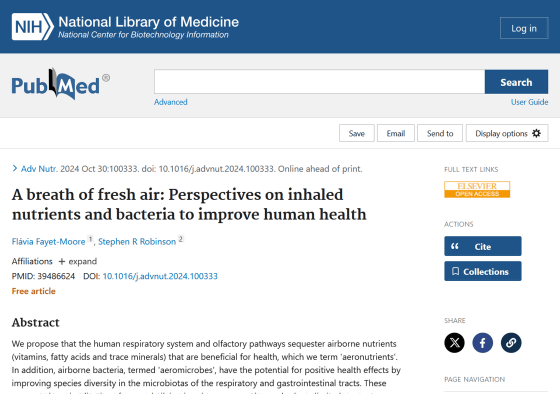Humans can absorb nutrients such as vitamins and iodine directly from the air

Many people have probably felt that the air tasted fresh when they took a deep breath in a place rich in nature. This may simply be because the air was less polluted, but
A breath of fresh air: Perspectives on inhaled nutrients and bacteria to improve human health - PubMed
https://pubmed.ncbi.nlm.nih.gov/39486624/

Air is an overlooked source of nutrients – evidence shows we can inhale some vitamins
https://theconversation.com/air-is-an-overlooked-source-of-nutrients-evidence-shows-we-can-inhale-some-vitamins-243486
Humans inhale about 9,000 liters of air per day, and a staggering 483 million liters over a lifetime. Unlike eating, which we only do a few times a day, breathing never stops, and the components in the air, even if they are in low concentrations, gradually accumulate in the human body.
Most of the research into the effects of air on health has focused on pollutants, not on what is beneficial in the air, but on what is harmful and should be filtered. Because there are so few nutrients in each breath, it was not thought that there was any point in studying them.
On the other hand, fresh air has long been valued as healthy in many cultures, and people intuitively feel that it is good for their health. 'For example, oxygen is a chemical that the body needs to maintain basic functions and is technically a nutrient ,' Moore and his colleagues say, arguing that the human body can also absorb other nutrients from the air.

Moore and his colleagues call these nutrients 'aeronutrients' to distinguish them from nutrients we ingest through food. Aeronutrients enter the body through a network of blood vessels in the nose, lungs, olfactory epithelium (the part of the body that detects smell), and the oropharynx (the back of the throat).
The lungs can absorb molecules up to 260 times larger than the intestines, and these molecules are then carried intact into the bloodstream, meaning that inhalable drugs like cocaine, nicotine, and opiates work within seconds and at lower concentrations than drugs taken orally.
The scientific idea that the human body can absorb nutrients from the air has been around for decades. In the 1960s,
In addition, a 2011 study showed that 'children living in coastal areas with a lot of seaweed had higher iodine concentrations in their urine and were less likely to suffer from iodine deficiency than children living inland or on coastal areas with less seaweed, even though their diets were the same. This result suggests that the iodine released by seaweed into the air may be absorbed into the body through breathing, helping to compensate for the children's iodine deficiency.
In addition to iodine, nutrients that can be inhaled include manganese , zinc , choline , vitamin C, calcium, magnesium, iron, and amino acids. Studies published in the 1950s showed that inhaling aerosolized vitamin B12 could treat vitamin B12 deficiency . Vitamin B12 supplementation is important for vegans, the elderly, diabetics, and people who consume too much alcohol, as these conditions are likely to be deficient in vitamin B12.

There are many unknowns about air nutrients, and we must first identify the beneficial components in the air of green spaces, forests, beaches, etc. and determine whether they qualify as air nutrients. Since aerosolized vitamin B12 has already been shown to be safe and effective , further research could potentially aerosolize micronutrients such as vitamin D to treat widespread nutritional deficiencies.
'We need to study these potential air nutrients in controlled experiments to determine their dosage, safety, and potential contribution to the diet. This is especially important in places where the air is highly filtered, such as airplanes, hospitals, submarines, and space stations,' Moore and colleagues wrote. 'Perhaps they will be found to help prevent modern diseases associated with urbanization, and future nutritional guidelines may recommend inhaling nutrients. Or, in addition to a healthy, balanced diet, it may be recommended that people spend plenty of time in nature breathing and ingesting airborne nutrients.'
Related Posts:
in Science, Posted by log1h_ik







